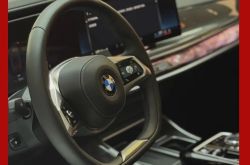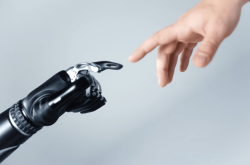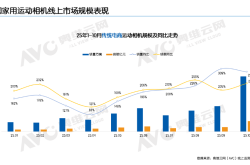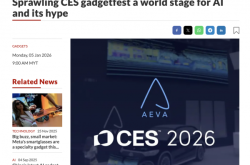Unhealthy Trends in the Auto Industry Draw Even Xinhua News Agency's Ire
![]() 11/20 2025
11/20 2025
![]() 370
370
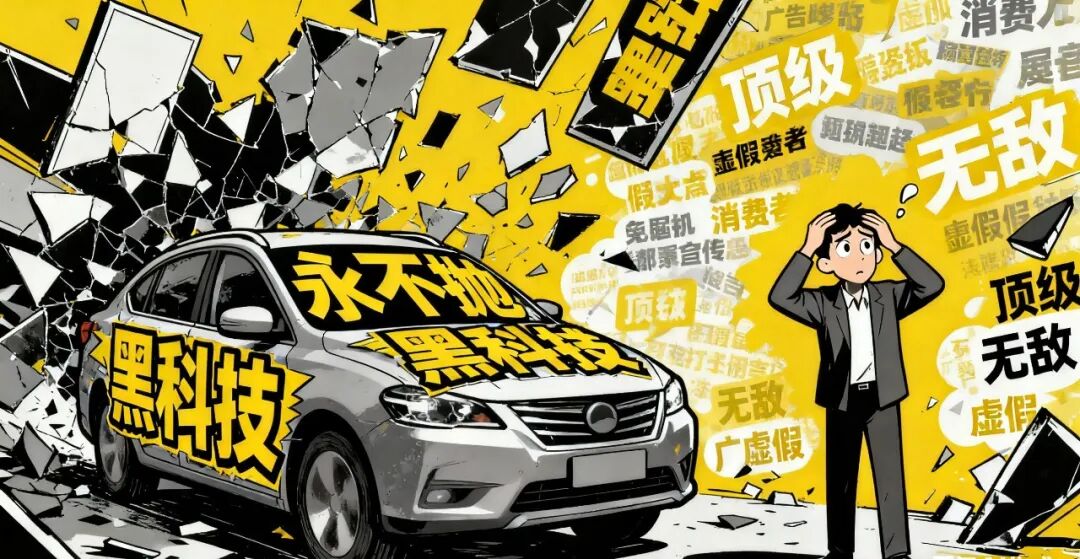
Text by Wang Xin, Edited by Yang Lingxiao, Produced by Electric New Species
On November 17, Xinhua News Agency released a new episode of its "Xinhua Video Review," delivering a scathing critique of the chaos plaguing the automotive industry, including its "grandiose style," "glib talk," and "linguistic corruption." This has ignited widespread attention and heated discussions across the sector.
The new energy vehicle (NEV) industry in China has witnessed smooth progress in recent years. In October, monthly sales of new NEVs surpassed 50% of total new car sales for the first time, reaching 51.6%. However, beneath these impressive figures, some unsettling trends are quietly emerging.
Some automakers are prioritizing marketing hype over the core principles of car manufacturing.
Press conferences have morphed into stand-up comedy routines, with technology promotion relying solely on flowery language. Instead of competing on technology and quality, peers are now vying to see who can deliver more persuasive speeches and whose marketing is more eye-catching.
This unhealthy trend not only confuses consumers, making it difficult for them to distinguish between genuine and false claims, but also disrupts the normal market competition order and undermines the foundation of industrial development.
01 Diverse Chaos in the Auto Industry: Marketing Strays from Core Principles
The chaos of "grandiosity" and "glib talk" in the automotive industry is not new. It has permeated various aspects, such as product promotion, market competition, and data release, manifesting in numerous ways.
The most glaring example is the confusing names given to configurations.
Nowadays, automakers are increasingly adopting a "martial arts" or "fantasy" style when naming parts and technologies. Ordinary batteries are dubbed "Dragon Scale Batteries," regular intelligent control systems become "Heavenly Eye Intelligent Control," and a plethora of convoluted and difficult-to-understand professional terms are piled up, which have been bluntly criticized by netizens as "linguistic corruption."
These names may sound mysterious and profound, but in reality, many are just conventional technologies with a new, flashy packaging. Consumers who want to understand the true configuration of a car must first "decipher" these complex names, making car buying feel like an archaeological expedition, and leaving them utterly bewildered.
Press conferences are even more chaotic. Many automakers' press events do not focus on the real advantages of their products but instead spend a considerable amount of time "dissing peers" and "mocking competitors." Some hint at their rivals' technological backwardness, while others directly use fabricated data and videos to imply competition, as if they cannot promote themselves without denigrating others.
Even more outrageous are the absurd statements made by automaker executives at press conferences, such as "the best under ten million," "driving can extend life by thirty years," and "you can take a nap when you get in the car."
These obviously absurd claims are being heavily promoted as selling points, which are both ridiculous and intellectually degrading, yet surprisingly, many people believe them.
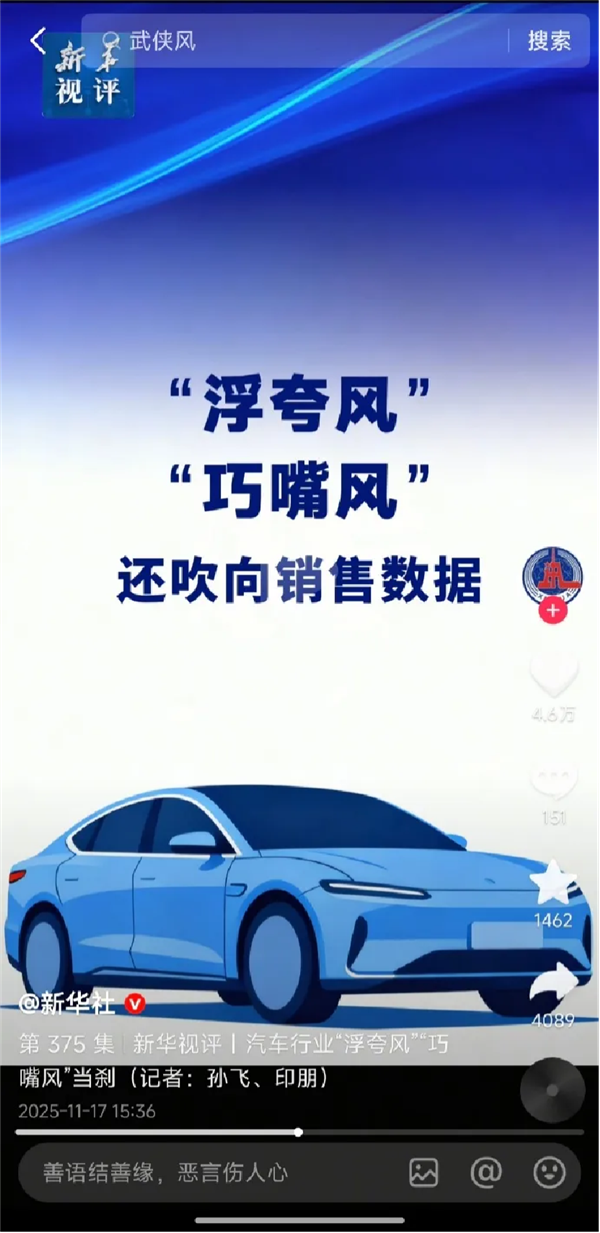
Data fraud further complicates market competition. To create the illusion of "hard-to-get" hot sales, some automakers are keen on releasing order data that "breaks ten thousand in minutes" and frequently launching extremely short-term sales rankings. However, behind these impressive figures, many are "watered-down" fake orders, with actual delivery volumes far from the promoted data.
Li Bin, the founder of NIO, has publicly stated that if you add up the order numbers announced by each company, the total car sales in the country would reach 100 million, which is clearly not in line with market reality.
What is even more unacceptable is the "bullying behavior" of some automakers. Faced with negative voices, they do not address the issues but instead use various means to suppress them.
When the media publishes objective evaluations, they receive lawyer's letters and court summons, being labeled as "black public relations." When car owners discover vehicle problems and want to speak out, they are required to sign confidentiality agreements upon delivery. Once a problem video is posted online, the account is instantly banned.
The core of these chaos is that automakers have fallen into the misconception of "emphasizing marketing over R&D, and concepts over practicality." They have forgotten that cars are technology-intensive products, and their core competitiveness should lie in product quality, technological innovation, and service experience, rather than flashy marketing rhetoric and false propaganda.
02 Regulatory Authorities Take Action: Strictly Rectifying the Chaos
Faced with the escalating industry chaos, regulatory authorities have not stood idly by but have decisively wielded their swords, launching a comprehensive and unprecedented special rectification campaign.
As early as September this year, six departments, including the Ministry of Industry and Information Technology and the Cyberspace Administration of China, jointly launched a three-month special rectification campaign against online chaos in the automotive industry.
This campaign is highly targeted, listing "exaggerated and false propaganda," "malicious slander and attacks," and "data fraud" as key rectification contents, aiming at illegal activities such as black public relations, water army hype, and coercing enterprises into cooperation.
The campaign explicitly requires platforms to strengthen the identification of AI water armies, unblock reporting channels, publicly expose non-compliant accounts, and dig deep into the responsibilities of marketing companies and automakers behind them, with zero tolerance.
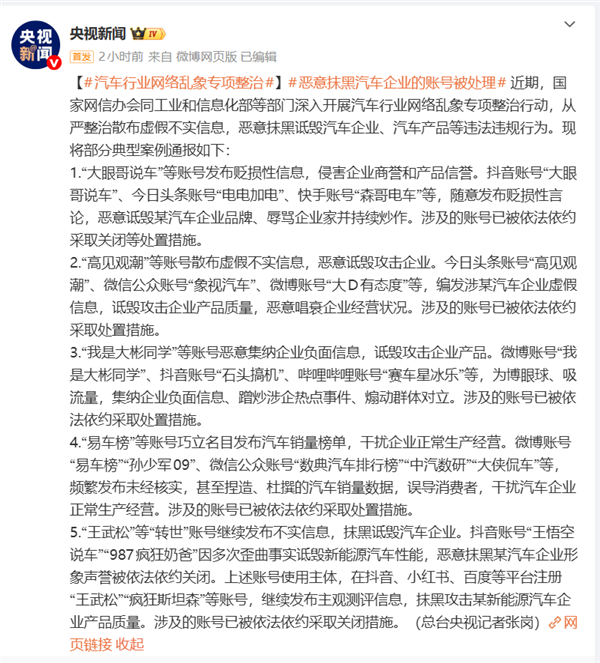
In November, the Cyberspace Administration of China, together with the Ministry of Industry and Information Technology and other departments, announced a batch of typical cases, making the rectification campaign a reality. Weibo accounts such as "Yiche Bang" and "Sun Shaojun 09," and WeChat public accounts like "Shudian Auto Rankings" were legally dealt with for frequently releasing unverified or even fabricated car sales data, misleading consumers and interfering with the normal production and operation of enterprises.
Douyin accounts like "Dayange Talks About Cars" and Today's Headlines accounts such as "Dian Dian Jia Dian" were directly shut down for randomly posting derogatory remarks, maliciously slandering automotive enterprise brands, and insulting entrepreneurs.
There are also "reincarnated" accounts like "Wang Wusong," which, after being banned for smearing enterprises, continued to post false information under a different name and were thoroughly cleaned up.
In addition to cracking down on non-compliant accounts, the rectification campaign also focuses on the non-compliant behavior of automakers themselves. The special rectification explicitly includes the behavior of automotive enterprise executives using their influence to "diss peers" and provoke conflicts online, as well as manipulating institutions to conduct false evaluations and selectively disclose sales data, all within the scope of the crackdown.
Whether it is malicious hype by third-party accounts or non-compliant propaganda directly participated in by automakers, both have become targets of the rectification.
The series of actions taken by regulatory authorities have sent a clear signal: the online chaos in the automotive industry can no longer continue. Any attempt to seek benefits through false propaganda and malicious competition will be seriously punished.
03 Industry Awakening Against Cutthroat Competition: Hard Work Leads to Long-Term Success
The strong rectification by regulatory authorities has also awakened self-reflection within the industry. More and more automakers are beginning to realize the severity of the issues, with increasing calls against cutthroat competition, and a trend of hard work is returning.
At this year's China Auto Chongqing Forum, executives from leading automakers such as BYD, Geely, and Changan collectively spoke out against industry chaos.
Li Yunfei of BYD called on peers to "compete on technology, not diss each other," promising to reject exaggerated propaganda and overdraft marketing. Zhu Huorong of Changan directly exposed four major industry chaos, including price wars and data fraud, emphasizing that "no matter how poor we are, we cannot neglect R&D." Yang Xueliang of Geely even stated bluntly that "until cutthroat competition is eliminated, Chinese cars cannot transform from big to strong."
These voices from the core forces of the industry indicate that automakers have begun to abandon the wrong path of malicious competition and refocus on the essence of industrial development.
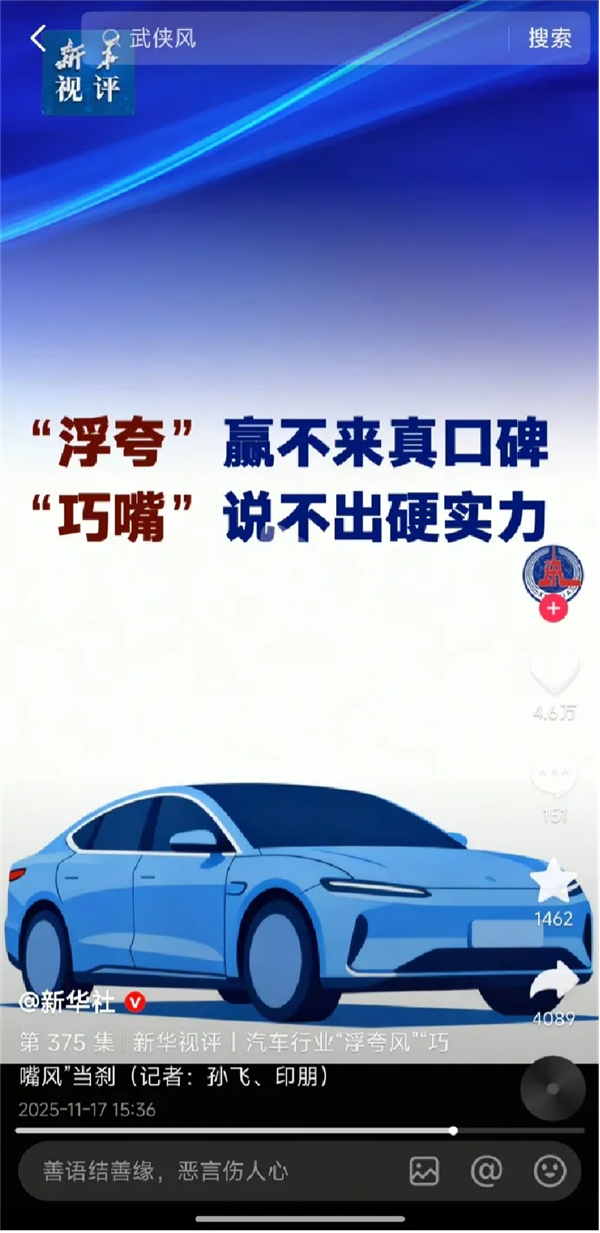
In addition to the self-awareness of leading enterprises, the development logic of the entire industry is also changing. More and more companies realize that "grandiosity" cannot win true reputation, and "glib talk" cannot demonstrate hard strength.
Consumers have discerning eyes. Short-term marketing hype may attract temporary attention, but in the long run, what can retain consumers are still safe and reliable quality, continuously innovative technology, and sincere and pragmatic service.
CCTV has recently spoken positively about the practices of Beijing automakers such as Xiaomi, which have made solid innovations in the fields of new energy and intelligent connected vehicles, contributing to the construction of a strong automotive country. This also shows that enterprises truly focused on technological R&D and product refinement will eventually receive recognition from the market and officials.
At the same time, consumers' ability to discern is also constantly improving. Those absurd promotional slogans and false sales data that once fooled people can no longer deceive rational consumers.
Netizens have expressed their hope that automakers can be more sincere and have fewer gimmicks and exaggerated marketing.
The awakening within the industry, combined with the rational choices of consumers and the strict supervision of regulatory authorities, is forming a joint force to drive the automotive industry out of the quagmire of marketing cutthroat competition and back onto the right track centered on products and technology.
Summary
The Auto Industry Must Return to Essence to Win Long-Term Development with Quality
Xinhua News Agency's strong criticism of the "grandiose style," "glib talk," and "linguistic corruption" in the auto industry has accurately pointed out the core issues in the current automotive sector.
These chaos have deviated marketing from its direction and competition from its essence, harming the interests of consumers and hindering the high-quality development of the industry.
Fortunately, the special rectification by regulatory authorities has yielded practical results, with a batch of non-compliant accounts being dealt with and the non-compliant behavior of automakers being curbed. The industry itself has also awakened, with leading automakers taking the lead in calling for an end to cutthroat competition and a return to technology and products. Consumers have also become more rational and are no longer misled by false propaganda.
These series of changes are purifying the ecosystem of the automotive industry.
The development of the automotive industry ultimately relies on hard strength. False propaganda cannot win long-lasting reputation, and malicious competition cannot bring sustained development. Only by focusing on R&D, making products with dedication, and providing sincere services can automakers achieve steady and long-term success in the fierce market competition.



